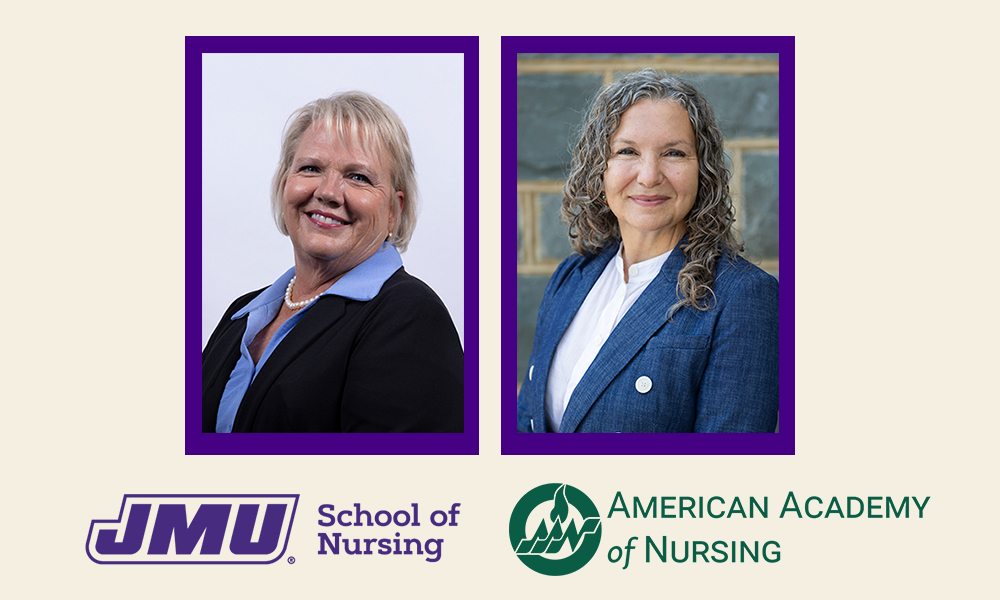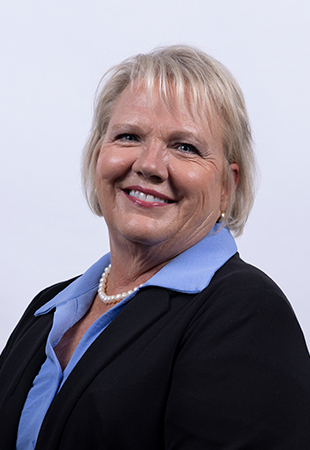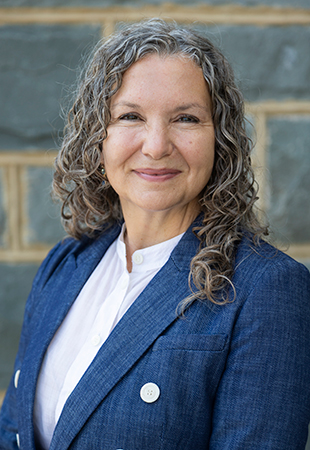SON faculty to be inducted as Fellows in American Academy of Nursing
College of Health and Behavioral Studies
Andrea Knopp and Jeannie Corey, faculty members in the School of Nursing, will be inducted as Fellows in the American Academy of Nursing (AAN) this October in honor of their impact on the profession of nursing locally, nationally, and globally.
As an organization, AAN advances health policy and practice through research and education of nursing knowledge and is comprised of approximately 3,200 Fellows around the world.
“There’s a small number of nurses in the world that receive this recognition, so it’s quite an honor,” said Corey about her nomination.
“It’s the highest award you can receive as a nurse,” said Knopp.
Nominees must apply with reflective writing on the impact of their nursing careers along with recommendations from two sponsors who are current Fellows in AAN.
“It was a truly reflective process that brought a deeper meaning to my nursing career,” said Corey.
As Fellows, Knopp and Corey will continue to contribute to the profession of nursing through research and advocacy along with identifying and sponsoring new inductees.
“I look forward to sponsoring other faculty in the School of Nursing that I easily see can get this same award because of their body of work,” said Knopp. “Often times as nurses, we do so much but don’t seek out accolades for ourselves, so being able to pass that on and highlight a peer of mine and the incredible work is so integral.”
Corey is set to retire from JMU this coming January and shared that “just because I’m retiring doesn’t mean I’m ending my relationship with the profession of nursing.”
“I’m looking forward to contributing in a different way, and through this Fellowship is one way I can do that,” said Corey.
Knopp and Corey will be officially inducted as Fellows at the annual AAN gala held in Washington, D.C. this October.
The event takes place after “the AAN’s annual Health Policy Conference,” explained Corey. “Inductees are required to attend the conference, and then we end the week with the gala as a big celebration.”
Both faculty members expressed gratitude toward JMU School of Nursing as an influential part of their success.
“For me at JMU, one of the reasons I’m here is because of the collaborative nature of our relationships, particularly in the School of Nursing. We support each other. We have professional and personal relationships that make it a place where we want to be and want to work,” said Knopp.
“I’m extremely grateful to Dr. Eaton for believing in me and supporting me and for all the mentors I’ve had throughout my life,” said Corey. “If I can be half the mentor they have been for me, I will feel like I’ve made a difference.
The impact and influence of Corey and Knopp’s contributions to the profession of nursing are detailed below.
Jeannie Corey, DNP, MSN, BSN, ADN
 Corey currently serves as the coordinator for the graduate Healthy Policy certificate program, as well as teaches in the graduate Nursing programs.
Corey currently serves as the coordinator for the graduate Healthy Policy certificate program, as well as teaches in the graduate Nursing programs.
“One of my areas of focus over my career is health policy,” said Corey. “We are fortunate at JMU to have strong health policy leaders and advocates.” Corey credits Melody Eaton, School of Nursing director, who started many of the health policy initiatives at JMU.
Corey has worked in operational leadership and academia throughout her career. “My particular focus areas were developing future healthcare leaders through my commitment to education and service,” said Corey.
Corey designed leadership curriculum at three different universities that focused on interprofessional education and practice, health policy advocacy and nursing’s unique contributions to improving healthcare outcomes.
“I’ve spent a number of years mentoring nursing doctoral students on their Doctor of Nursing Practice (DNP) journey,” said Corey. “I’ve had students execute projects all across the country, and internationally.” These contributions impact not only DNP students but their particular areas of interest and service to improve healthcare outcomes for numerous individuals and populations.
“I’m passionate about my DNP students’ work. Their projects are phenomenal and will influence the practice of nursing for years to come. I’m really proud of them,” said Corey.
Corey also started national research teams that explored DNP program practices related to curriculum, practicum, project types and more. “I founded a national DNP think tank, and from that a national DNP webinar series,” said Corey.
“A DNP is a degree, not a role,” explained Corey. “Individuals who graduate with a DNP degree may fill a variety of different nursing roles and will serve as the healthcare leaders of the future..” Corey’s work analyzes how DNP programs across the country prepare people to practice in a variety of settings.
Corey shared that becoming a nurse leader in a healthcare organization early in her career jumpstarted her interest in supporting and encouraging others to be “the best leaders they can be.”
“Becoming a nurse leader allowed me to influence more patients than I was able to provide direct care for. Influencing other nurses created impact and influence on health outcomes, more than I was able to influence alone.”
Andrea Knopp, PhD, MSN, MPH, FNP-BC
 Knopp is a professor and Associate Director of Graduate Programs in the School of Nursing.
Knopp is a professor and Associate Director of Graduate Programs in the School of Nursing.
Knopp’s contributions to the profession of nursing primarily center on international healthcare work, which started in her undergraduate studies.
“When I was in my undergraduate program in Georgia, I had an incredible professor who took us to Haiti for a clinical experience,” said Knopp. “It was truly life changing for me. From that point forward, I realized that where I wanted to direct my profession and my service was in international work.”
Knopp then went on to work for a non-profit in Burkina Faso, starting HIV healthcare programs in conjunction with the state provided primary care to a community of 71 villages.
Returning from this experience, Knopp went on to receive her master’s degrees in nursing as a Family Nurse Practition and in International Public Health from Emory University and worked in underserved populations in Atlanta, Georgia.
“I came into education as an adjunct while keeping my clinical practice,” said Knopp. While there, she was approached by a recruiter from the University of Virginia to receive her PhD.
“I ended up doing my PhD in Egypt, focusing on a minority group of women. That started directing me into this path of publications about populations that may have a more difficult time accessing care for various reasons,” said Knopp.
Knopp maintained her passion for international work when she became a professor at JMU, sharing the faculty and leadership in the School of Nursing has “always been very supportive” of her ideas and projects that center international work in student clinical experiences
That support allowed her to continue doing work with students in Kenya, Tanzania and now Ghana, doing clinical practice, introducing students to the “same kind of experience I had that changed [Knopp]’s life”, and collaborate with faculty and populations there to try and improve health,” said Knopp.
